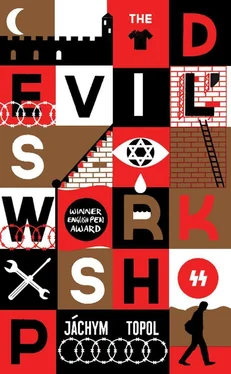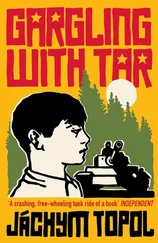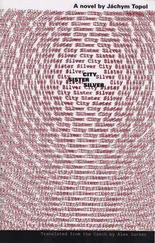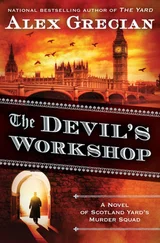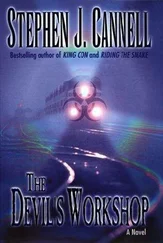Our work had just begun.
Rolf ’s article was reprinted in many languages, it was published all over the world, so it wasn’t just academics who could speak for Terezín any more, academics installed by a government that didn’t want to pour billions or even millions into a decaying town with no army. Now there were other spokesmen for the town besides the board members and researchers, feasting off of their cushy incomes and keeping quiet about the coming of the bulldozers. The world had found out about us. Visitors started arriving.
And that was the beginning of the Comenium.
One of the cornerstones of the Comenium student commune was laid the day I spied a gorgeous girl in shorts and a T-shirt stumbling across Central Square in the summer heat, a blond braid hanging down her sweaty back. There I was, merrily herding along my little flock, the few that had managed to escape both the auction block and the mental cases’ maws. The wind had long since blown the stink of prison off of me, and she recognized me. Yes, she had come because of Rudolf’s article, she felt aligned with us, she said, and wanted to meet Lebo and stuff, help us in our cause. Dazzled by this apparition of a girl, I said nothing, just turned and led her through the dust kicked up by the goat’s hooves. I was longing for twilight, eager for it to be sundown, so maybe she wouldn’t notice I was blushing with embarrassment, though I was also leaning in towards her, with a touch of hungry boldness. She gazed at me curiously as I led her to Lebo, the curtains stirring here and there in the hovels on either side, people peeking from half-open windows as Sara’s sandals slapped against the cobblestones. Not many found their way into our streets in those days, just buses with tourists visiting the Monument. Sara had set out for Terezín from Sweden to track down the bunks where her grandfather and grandmother had supposedly once rested their heads, before they were killed. She was one of the seekers of the bunks, young people with brains darkened by the cloud of the terrible past, by the horrors that had befallen their parents, grandparents, relatives, or just by the fact that those horrors had happened at all. Could they happen again? What is man capable of? How come it happened to them, but I was spared? What would I have done if it had been me being led to my death? Can it happen again? The seekers turned these morbid questions over and over again in their minds, a demon had taken hold of them, clouding their brains. Even now, they were tormented by the murders of yesteryear, making them ripe for the psychiatrist’s couch. But some of them took to the road, heading for the East, all on their own, with a backpack and a credit card from their parents in their pocket, and went digging through the damp ruins of Poland, Lithuania, Russia — in short, everywhere mass graves were common. The seekers, like drops of water, seeped into the underground currents of the mysterious East, so it was no surprise they often sank to the bottom in anguish. And occasionally one of them would turn up in Terezín. Longing to ease the painful pressure on their brain, these were no ordinary tourists, content to wander down a few trails of genocide, maintained for the world by the Monument. Ordinary tourists strolled through Terezín like it was a medieval castle, taking snapshots, shooting videos of the dungeons and torture chambers to show the family afterwards. The bunk seekers would never even think of such a thing. They showed up here crazed with pain, seized by the eternal question every seeker asked: If it happened here, can it happen again? They knew they weren’t in a medieval castle but in an abyss where the world had been torn apart, a place without mercy or compassion, where anything was possible. And it ate at their brains. Sara, too, had arrived sick like this, which was why she insisted on exploring every inch of the town. I have a feeling, she said over the trampling hoofs of my herd, that they left a message here for me … somewhere.
First she had wandered around the Monument, then she headed over to our seedy little town. I want to walk by every wall, every rampart in this town of death, I want to understand, to know, to feel, Sara said amid the clouds of dust and the bleating herd. She seemed a little dehydrated to me. I took her to Lebo.
That day, like every other day, I grazed my goats till dusk, but once the darkness had swallowed up the last shades of red, I was driving my flock back home, past Lebo’s ground-floor room, and the lights were on and I saw Sara, well refreshed now, thanks to my aunts. She was an important visitor, after all — she brought interest to our town of destruction, fresh air and life would follow in her footsteps, my aunts could sense it somehow.
Inside, Sara was listening to Lebo, the man who had drawn his first breath here at the eye of the hurricane, at the centre of all the horror, most likely right next to the bunk where Sara’s granny had slept. She paid close attention as Lebo opened his black satchel and showed her the old notes, spikes, and rusty bullet shells. I had completely forgotten that somewhere down in the catacombs, where nothing rots, we had found two fingernails, probably torn off scratching the plaster long since washed away by groundwater. Lebo had kept them, so Sara could touch them. She was hungry for details of life in the town of death, so Lebo talked.
The seekers of the bunks came thirsting for knowledge. All of them had been directly affected by what went on here and needed to hear that, despite all the horrible things that had happened to their grandparents or parents, in spite of it all and through it all, they could go on living. And the seekers spread the word about Lebo to each other, so more of them came, wanting to hear the witness who had been born in hell and survived and was now alive in the modern era. And coming face to face with the living Lebo and his objects helped them. And some — like Sara — stayed.
Sara! It wasn’t only her grandfather and grandmother who had breathed their last here. About twenty of her relatives had perished in Terezín or somewhere in the black holes of Poland. Only her dad managed to save himself. Thanks to the Swedish Red Cross, he made it out on a children’s transport to Sweden. Sara wasn’t interested in the streets the town and the government had designated to be preserved. She liked tramping along the crumbling ramparts, crawling through the overgrown drains, running her fingers over the scratches that might’ve been greetings from those going to their death. She also enjoyed taking part in the lives of those of us who were left, and that was the thing, that was the reason why they liked her. She enjoyed listening to the old codgers puffing away on the peeling benches of Central Square, speaking with pride of the days when the regiments of the Czechoslovak People’s Army paraded through, and how many of them had paraded with them, or even led those regiments. Sara spoke German, which all the old people here knew. She was the Swedish girl who had come to us from the world, an apparition, a sign of life. At first the locals just stared cautiously through the curtains, watching as she looked around and listened in fascination, here in the graveyard condemned by the world to ruin and decay.
But soon Sara had an open door wherever she went, probably because she reminded the old ladies of a granddaughter of theirs, or a little niece, and they loved telling her stories about their youthful years in Terezín. Maybe they had even known her grandmother — oh, definitely. Whenever Sara paid a visit to their homes, which had been spared so far, the old ladies wiped the dust off their plastic tablecloths and opened their glass-fronted cabinets, fumbling among the painted dolls, glass deer, and decorative cups and spoons, reaching for the brandy glasses and filling Sara’s to the brim. Afterwards when she came back to our squat, she would either whoop it up or crawl straight into her sleeping bag on the bunk, and while I pounded away on the keyboard, following Lebo’s instructions, or Lebo read out the news we had received from the world, Sara would sleep, puffing in and out. We were glad to have her here. Soon all of the town’s old folks and drunkards were saying hello to Sara, sometimes even the hopeless mental cases would shyly waddle along behind her in the dust, as though maybe she could take them away somehow. It fascinated Sara when, in her honour, Aunt Fridrich cut off a hen’s head and threw it out of the window, into the brook under the ramparts, the way it had always been done, and she was glad to help Mr Hamáček haul his basket of kohlrabi or sacks of potatoes to Central Square. She even got involved with the kitchen, helping to serve the tea. Sara had decided to live a normal life in this town of death, and I had the feeling she was recuperating, coming out of her grief, escaping the despair that can cloud a mind with blackness and, especially in young and innocent people, produce a shock of realization at how terrible evil is and can be.
Читать дальше
